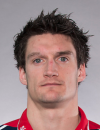Dr Len Parker Simpson
Teaching Fellow in Sports Physiology

- Human Performance Science Reseach Group
- Moray House School of Education and Sport, ISPEHS
- University of Edinburgh
Contact details
Address
- Street
-
Moray House School of Education and Sport, SL
- City
- University of Edinburgh (Holyrood Campus)
- Post code
- EH8 8AQ
Background
Len completed his PhD in human bioenergetics at the University of Exeter, UK. Specifically, he investigated the mechanisms determining the parameters within the ‘Critical Power’ model. Consequently, his academic expertise lie in the areas of bioenergetic models, extreme- and severe-intensity exercise tolerance and the associated physiology contributing to human performance across this intensity and duration spectrum.
He took his mechanistic knowledge and understanding of human performance capabilities and transitioned into the applied field, initially working for 7 years as an applied Performance Physiologist with the English Institute of Sport, supporting British Cycling through both London 2012 Paralympic and Rio 2016 Olympic Games. Through supporting some of Britain’s greatest Olympic athletes, Len was fortunate to work with some exceptional people and within high-performing teams. Sharing knowledge with others and creating innovative solutions to performance problems by working in the overlapping areas between expertise; something which has been one of the most consistently rewarding parts of Len’s work and has helped him, and others, stand at the vanguard of human performance.
As a result of the applied focus of Len’s previous roles, he has developed interest and expertise in various areas relating to human performance including (but not limited to) training prescription, periodization & optimisation of training, monitoring response to and/or within training, tapering, exercise during pregnancy and return to elite performance post-partum. While the majority of Len’s applied experience has been with cycling, he also has experience across numerous other ‘linear energetic’ sports, such as Triathlon, Rowing, Swimming and Athletics.
Most recently, Len was Head of Performance Science with the High Performance Centre of Japan Cycling. Here, Len used both human science to improve propulsive forces and technological science to reduce resistive forces acting against Japan’s best Track Cyclists. Working with a small team, adopting and successfully embedding this approach within Japan resulted in faster riders and thus, improved probability of medal success at Tokyo 2020(1). Following a 13-year hiatus, Japan returned an Olympic Silver at their home Games [Women’s Omnium].
Undergraduate teaching
Course Organiser:
- Sport Science 1A: Exercise Physiology & Skill Acquisition – 1st year compulsorily course with over 150 students
- Sport Physiology 4 – 4th year optional course with over 40 students
Teaching delivery:
- Sport Science 1A (Exercise Physiology)
- Sport Science 2A (Biochemistry of Exercise)
- Applying Sport Science 3
- Sport Science (Project) 3
- Sport Physiology 4
- Environmental Physiology 4
Supervision:
- Sport Science (Project) 3
- BSc Applied Sport Science Dissertation
Postgraduate teaching
- MSc Strength & Conditioning Dissertation
Open to PhD supervision enquiries?
Yes
Invited speaker
Invited Speaker at the upcoming Cycling into Practice Cycling Symposium, Glasgow, ahead of the inaugural World Cycling Championships, Glasgow 2023: https://www.uws.ac.uk/cycling-symposium/ - 1st August 2023.
Title: All Training is Wrong, but Some is useful.
Black, M. I., Parker Simpson, L., Goulding, R. P., & Spragg, J. (2022). A critique of “A critical review of critical power”. European Journal of Applied Physiology. https://doi.org/10.1007/s00421-022-04959-7
Parker Simpson, L., Hopker, J. G., & Davison, R. C. R. (2022). Cycling. In Sport and Exercise Physiology Testing Guidelines: Volume I – Sport Testing (2nd ed.). Routledge. https://doi.org/10.4324/9781003045281
Kordi, M., Parker Simpson, L., Thomas, K., Goodall, S., Maden-Wilkinson, T., Menzies, C., & Howatson, G. (2021). The Relationship Between Neuromuscular Function and the W’ in Elite Cyclists. International Journal of Sports Physiology and Performance, 1–7. https://doi.org/10.1123/ijspp.2020-0861
Kordi, M., Fullerton, C., Passfield, L., & Parker Simpson, L. (2019). Influence of upright versus time trial cycling position on determination of critical power and W’ in trained cyclists. European Journal of Sport Science, 19(2), 192–198. https://doi.org/10.1080/17461391.2018.1495768
Kordi, M., Menzies, C., & Parker Simpson, L. (2018). Relationship between power-duration parameters and mechanical and anthropometric properties of the thigh in elite cyclists. European Journal of Applied Physiology, 118(3), 637–645. https://doi.org/10.1007/s00421-018-3807-1
Parker Simpson, L., & Kordi, M. (2017). Comparison of Critical Power and W’ Derived From 2 or 3 Maximal Tests. International Journal of Sports Physiology and Performance, 12(6), 825–830. https://doi.org/10.1123/ijspp.2016-0371
Parker Simpson, L., Jones, A. M., Skiba, P. F., Vanhatalo, A., & Wilkerson, D. (2015). Influence of hypoxia on the power-duration relationship during high-intensity exercise. International Journal of Sports Medicine, 36(2), 113–119. https://doi.org/10.1055/s-0034-1389943
Parker Simpson, L., Jones, A. M., Vanhatalo, A., & Wilkerson, D. P. (2012). Influence of initial metabolic rate on the power-duration relationship for all-out exercise. European Journal of Applied Physiology, 112(7), 2467–2473. https://doi.org/10.1007/s00421-011-2214-7
